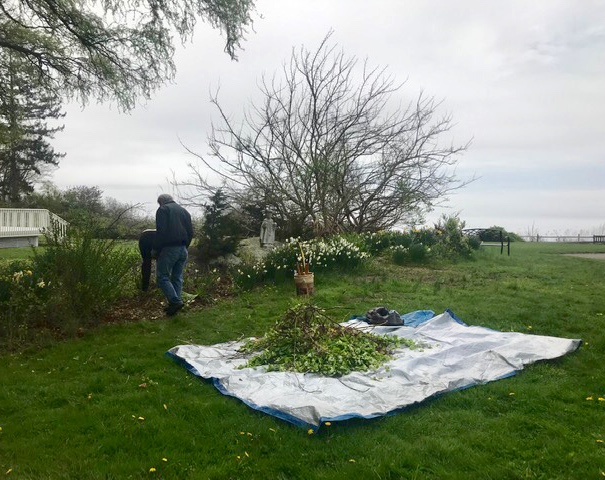Serendipity and Sorrow: Soil and Spirit
It was serendipitous that on the “clean up” day for the Mercy by the Sea grounds, there coincided a retreat for individuals who had lost children. At first, the two gatherings seemed to be totally unrelated, until later that day. Volunteers had decided to concentrate on the new pollinator garden next to Seascape. Removing invasive garlic mustard and oriental bittersweet, the ground was prepared for pollinator-friendly plants.

Unbeknownst to the volunteers on bended knees, in the adjacent building a group of parents gathered to bend towards their own deeply rooted sorrow. Both groups dealt in their own way with a world scarred by unnatural tragedies. Despite their sorrow, one gathered to heal the land and the other to heal their hearts. Without ever exchanging a word or committing to a plan, the one group carefully prepared the soil and the other group lovingly cradled the box of butterflies they planned to release. The serendipity of these actions sprouted from sorrow yet blossomed in hope. These two seemingly unrelated groups shared a belief in a miraculous metamorphosis. Holding their sorrows and releasing their hopes.
“You have turned for me my mourning into dancing; You have loosed my sackcloth and girded me with gladness.” - Psalm 30:11
As you follow your own path of transformation, consider it time well spent to sit in the gazebo next to the new pollinator garden, perhaps pondering which of your sorrows might be released and transformed into joy. Digging deep into the recesses of your soul, and on bended knee, lifting your sorrow to the sky where it will take flight, dancing in the light, transformed it into a gift of beauty. Become part of these serendipitous moments that take place at Mercy by the Sea where land and sea and sky meet and heaven and earth converge.
If you would like to contribute plants from your own gardens as you divide your perennials this spring, we are looking for the following; Wild Geranium, Spiderwort, Swamp Milkweed, New England Aster, Purple Giant Hyssop, False Indigo, Coreopsis, Purple Coneflower, Joe Pye Weed, Heliopsis, Cardinal Flower, Lobelia, Bee Balm, Beardtongue, Black Eyed Susan and Verbena.
Plants can be dropped off in front of the greenhouse on Tuesday mornings. Your contribution will be included in the Mercy by the Sea pollinator garden along with milkweed, the exclusive nutrient source for Monarch caterpillars.
The Sisters of Mercy are committed to revere the Earth and to work toward sustainability. Join the collective Mercy effort which, in addition to other organizations, networked along the migratory path of the Monarch. Pollinator gardens are being planted at other Mercy sites including Carlow University in Pittsburgh, Pennsylvania; University of St. Joseph in West Hartford, Connecticut; and Mercy Farm in Benson, Vermont. The hope is to have 16 universities, convents and spirituality centers plant and maintain pollinator gardens along the Monarch migratory route. Be part of the serendipity!
For additional information on pollinator gardens, visit the following websites: The Forest Service’s Gardening for Pollinators, the Xerces Society for Invertebrate Conservation, and Monarch Watch.
